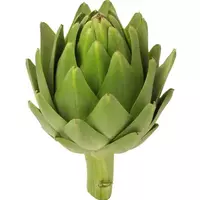Artichoke

The Mediterranean is considered the birthplace of artichoke, it has been known for about 5 thousand years and was widespread in ancient Greece, Egypt and Rome. , Greeks and Romans have always considered artichoke a delicacy and a very strong aphrodisiac. The Mediterranean and today is one of the unsurpassed leaders in the cultivation of artichokes.
However, this culture is currently growing in both Central Europe and America. So almost all artichokes that fill American markets are cultivated in California. The small town of this state - Castroville - even claims to be the high-profile artichoke capital of the world. Every year, the Artichoke Queen is elected in this city. The most famous holder of this title was Marilyn Monroe. She became Queen of Artichokes in 194
9. Later, it was she, a big fan of this culture herself, who inspired a large number of people to culinary delights with artichokes.
The plant, which looks like a thistle, reaches a height of 2 meters. It is crowned by a rounded flower head and a fleshy flowerbed. The "vegetable" that we eat is essentially not a fully opened basket of the future flower. There are more than 140 species of artichokes, but only about 40 species have nutritional value.
Artichokes are served hot and cold to the table. The artichoke in its raw form resembles an underaged walnut to taste. By tradition and to preserve the useful properties of artichoke, it is prepared fresh. However, they can be stored for a week, but the aroma begins to lose almost immediately after cutting off the stem.
Eating artichokes is extremely diverse - they can be served as a separate dish, and as a side dish, salads and pizzas are made from them, in addition, they are added to pastes, stews and pies. There are recipes for desserts and artichoke bread. This is all the more pleasant despite the fact that the calorie content of artichoke is just over 28 kcal. per 100 gr.
The benefits of artichoke
Already in the Middle Ages, artichoke was valued as a wonderful medicinal plant. Its beneficial effect on the digestive process is noted, it is an indispensable assistant in activating and supporting the protective functions of the liver, as well as in resistance to various inflammatory processes. Currently, there is no doubt about the effectiveness of artichoke extract in treating jaundice.
This plant is able to reduce cholesterol and urea levels, which is the main benefit of artichoke. It is recommended as a remedy that prevents the development of atherosclerosis. The benefits of artichoke are also that it effectively helps with allergies, kidney diseases. Artichoke juice has a beneficial effect on the condition of hair, strengthening their roots.
A variety of useful properties of artichoke are explained by its composition. It has a lot of proteins and fiber and no fat at all. Artichoke is rich in vitamins of group B, C. It also contains a rather rare vitamin K, which is involved in the synthesis of proteins and plays an important role in the metabolism. Artichoke contains significant amounts of potassium, phosphorus, calcium, sodium, iron.
The harms of artichoke
The harm of artichoke can affect people suffering from gastritis with reduced acidity, reduced pressure (hypotension), as well as in rare cases of individual intolerance to the product.
artichoke 28.2 kCal
Energy value of artichoke (Ratio of proteins, fats, carbohydrates - ju):
Proteins: 1.2 g (~ 5 kCal)
Fats: 0.1 g (~ 1 kCal)
Carbohydrates: 6g (~ 24kCal)
Energy ratio (b | y): 17% | 3% | 85%
 Español
Español Français
Français Português
Português Русский
Русский 简体中文
简体中文 繁體中文
繁體中文 日本語
日本語 한국어
한국어 العربية
العربية Türkçe
Türkçe Қазақ
Қазақ Deutsch
Deutsch Italiano
Italiano Українська
Українська
